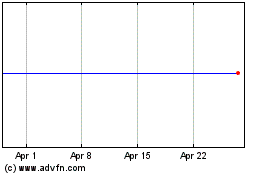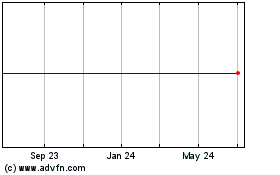By Thomas M. Burton
U.S. health regulators have drafted guidelines that would
require a Covid-19 vaccine to meet rigorous standards to gain a
speedy clearance for use, according to people familiar with the
matter, an effort to ensure the shots work safely before they are
widely distributed.
Among the proposed requirements is that a coronavirus shot
reduce the rate of infections by 50% compared with a placebo, which
the regulators have already required for a regular approval of any
Covid-19 vaccines.
The regulators' plans have been caught up in partisan fighting
over the safety and timing of a Covid-19 vaccine, and they are
unfolding amid concerns the Trump administration is putting
politics ahead of science while interfering in the decisions of
federal health agencies.
The draft requirements indicate the Food and Drug Administration
wants to hold Covid-19 vaccines to high standards similar to what
it would have used for a typical review of the shots, the people
said, even though the agency plans to conduct the review more
quickly than normal because of the urgent need created by the
coronavirus pandemic.
Their strict requirements, if they hold up, could ease the
concerns of many Americans who polls show are hesitant to get a
shot -- partly out of concerns the administration is trying to rush
out a vaccine.
The White House must sign off on the plan. The FDA submitted the
draft plan for review last week to Secretary of Health and Human
Services Alex Azar, according to the people. The White House Office
of Management and Budget is also reviewing the plan, the people
said.
The draft proposes the safety and effectiveness standards that a
Covid-19 vaccine would need to meet for the FDA to permit use,
called an emergency-use authorization because the agency plans to
issue the decision on an accelerated timeline due to the
pandemic.
If the Trump administration signs off on the guidelines, it
would make it difficult for a vaccine to be authorized for
emergency use before Election Day, the people said.
The administration could weaken the requirements, however, so
that a vaccine could gain emergency-use authorization earlier.
Mr. Azar and other administration officials didn't raise serious
objections to the proposals during a meeting Tuesday, people
familiar with the matter said. It was unclear when the
administration might sign off on the guidelines or call for
revisions.
The Washington Post first reported that the FDA planned
relatively tough standards for greenlighting a Covid-19
vaccine.
Covid-19 vaccines from AstraZeneca PLC, Moderna Inc. and Pfizer
Inc. are in the final stage of testing. The trials for the Moderna
and Pfizer vaccines could start providing some key results in late
October or early November, according to the companies.
Before the vaccines can be made available to the public, the FDA
must sign off. Normally, the agency decides whether to approve a
vaccine. Given the urgency of the pandemic, the agency plans to
issue an authorization for emergency use, which the FDA can do
faster.
The guidelines for granting an emergency-use authorization have
been a subject of great interest, because of concerns the Trump
administration wants to champion a vaccine's clearance ahead of the
Nov. 3 election.
Fueling the concerns are President Trump's own comments,
including a recent promise there would be an FDA-authorized vaccine
as early as October. "We're going to have a vaccine very soon,
maybe even before a very special date," he said at a recent press
conference, referring to election day. "You know what date I'm
talking about."
Mr. Trump and his administration have sought to shape previous
health-related guidelines. Under pressure from the administration,
the Centers for Disease Control and Prevention in July updated its
recommendations to encourage schools to reopen.
This week, the CDC removed guidelines that acknowledged the
coronavirus can spread through tiny particles that travel widely
across the air, just days after the guidelines were updated. The
agency said the revisions were posted in error.
The president also has contradicted or criticized top health
officials, such as CDC Director Robert Redfield and National
Institutes of Allergy and Infectious Diseases Director Anthony
Fauci.
Word that the FDA would green light any Covid-19 vaccine through
an emergency-use authorization, rather than the normal approval
process, triggered concerns in some quarters the administration
would try to pressure the agency to allow use before a shot is
fully vetted.
Emergency-use authorizations are a kind of interim FDA clearance
the agency uses during pandemics to speed up the use of urgently
needed medicines. The authorization is temporary, and differs from
a full approval, which any vaccine would still ultimately need to
stay on the market after the pandemic ends.
To grant the authorization, the agency typically eases the
standards for a traditional FDA approval and merely balances the
benefits of the medicine's use with any risks like side effects
from taking it.
In the case of Covid-19 vaccines, the draft EUA document calls
for more stringent standards than is usual, the people said,
largely because a vaccine may be given to millions of healthy
people.
The standard is quite similar to that for traditional vaccine
approval, according to the people. For example, FDA's
already-stated standard for full approval of a Covid-19 vaccine
also requires that the shot reduce the rates of infection 50%
better than a placebo in a late-stage trial.
The late-stage, or Phase 3, trials for a Covid-19 vaccine must
randomly assign subjects to the experimental vaccine or a placebo,
just as the FDA requires for a standard vaccine approval.
Also, the draft guidelines wouldn't allow clearance of a vaccine
simply based on showing an increase in antibodies to Covid-19 in a
patient's bloodstream, according to the people familiar with the
plan.
Write to Thomas M. Burton at tom.burton@wsj.com
(END) Dow Jones Newswires
September 22, 2020 19:51 ET (23:51 GMT)
Copyright (c) 2020 Dow Jones & Company, Inc.
AstraZeneca (NYSE:AZN)
Historical Stock Chart
From Mar 2024 to Apr 2024

AstraZeneca (NYSE:AZN)
Historical Stock Chart
From Apr 2023 to Apr 2024
